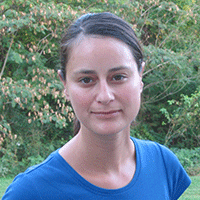ESE and RTI researchers awarded IMPACT funding to collaborate on improving environmental health
December 5, 2018
Three teams led by researchers from RTI International and the UNC Gillings School of Global Public Health have received funding from the Initiative to Maximize Partnerships and Catalyze Teamwork (IMPACT) for work on projects that will improve environmental health.
Co-principal investigators from the Gillings School include environmental sciences and engineering (ESE) faculty members Rebecca Fry, PhD, Carol Remmer Angle Distinguished Professor and director of the Gillings School’s Institute for Environmental Health Solutions; William Vizuete, PhD, associate professor, and Jill Stewart, PhD, associate professor and director of the UNC Galapagos Initiative/Center for Galapagos Studies.
Other Gillings School team members, all from ESE, are Kun Lu, PhD, associate professor, doctoral student Martha Scott Tomlinson, Karsten Baumann, PhD, assistant professor, Jason Surratt, PhD, professor, Mark Sobsey, PhD, Kenan Distinguished Professor, Jamie Bartram, PhD, Don and Jennifer Holzworth Distinguished Professor, Michael Fisher, PhD, assistant professor; Emanuele Sozzi, PhD, research associate, Margie Mazzarella, proposals coordinator at The Water Institute at UNC, based in ESE, and doctoral student Alyssa Grube.
The teams will receive up to $250,000 each over the course of two years.
The projects are:
Children’s Environmental Solutions Study
Toxic metals are polluting the environment in North Carolina from both geogenic sources and industry-caused contamination. Preliminary research suggests that these metals likely harm the developing fetus.
Addressing the need for a minimally invasive way to assess children’s exposure to environmental contaminants, the project will focus on the use of dried blood spots as a means of assessing toxic metal exposure and biomarkers. The team will leverage the ongoing study, Environment, Perinatal Outcomes and Children’s Health (EPOCH), which is based at UNC’s high-risk pregnancy clinic and includes women from throughout North Carolina.
Rebecca Fry, PhD (Gillings School), and Keith Levine, PhD (RTI), are co-principal investigators. The team includes Tracy Manuck, MD, associate professor of obstetrics and gynecology in the UNC School of Medicine, and from the Gillings School, Kun Lu, PhD, ESE associate professor and Martha Scott Tomlinson, ESE graduate research assistant. From RTI are Chamindu Liyanapatirana, PhD, Miranda Jane De Boskey, Scott Shone, PhD, Lisa Gehtland, MD, Eric Otto Johnson, PhD, and Christina Markunas, PhD.
Toxicity of Complex Aerosols from Wood Burning Cook Stoves
In low- and middle-income countries (LMICs), exposure to wood burning cookstoves emissions causes 2.8 million premature deaths. Emissions from cookstoves consist of airborne particulate matter (PM), various volatile organic compounds (VOC) and other harmful gases. When released into the ambient environment, these emissions can undergo photochemical transformations. While many epidemiological and toxicological studies have focused separately on the adverse health effects of exposures either to gas-phase pollutants or PM, much less is known about the combined effects and their interaction with other pollutants.
The proposed study seeks to gather data from fresh and photochemically aged particles/gasses to better understand the scientific drivers of health impacts from cookstove emissions, thereby laying the foundation to inform field studies that will drive intervention and policy changes.
Led by ESE associate professor William Vizuete, PhD, and Prakash Doraiswamy, PhD, from RTI, the team includes Karsten Baumann, PhD, and Jason Surratt, PhD, of the Gillings School faculty and Jean Kim, PhD, and Ryan Chartier, of RTI.
Surveillance, Modeling, Analytics and Risk Assessment Tool for Evidence-Responsive Antimicrobial Resistance Management
Antimicrobial resistance (AMR) poses a critical and growing threat to global health. The “One Health” approach—that is, understanding the interconnected roles of people, animals and the environment—is vital to combating the emergence and spread of AMR. However, a lack of or poorly integrated surveillance and monitoring data have made it difficult to produce evidence needed to identify and address critical AMR sources, hotspots, and exposure routes; conduct meaningful risk assessments; or prioritize potential management options.
The team seeks to develop and pilot the first integrated and scalable regional One Health monitoring, analysis and decision support tool designed for local actors and policy makers who need to assess AMR hazards and prioritize interventions to control risk.
Led by Jill Stewart, PhD, from the Gillings School and Elisabetta Lambertini, PhD, of RTI, the team includes the Gillings School’s Mark Sobsey, PhD, Jamie Bartram, PhD, Mike Fisher, PhD, Emanuele Sozzi, PhD, Margie Mazzarella, and doctoral student Alyssa Grube; and RTI’s Kasey Jones, Linda Andrews, Anna Aceituno, Jen Wellard, Sarah Rhea, DVM, PhD, Justine Allpress, Josh Levy, Donal Bisanzio, PhD, Juliana Ruzante, PhD, and Breda Munoz, PhD.
“These projects address key risk factors for adverse health globally and in North Carolina,” said Barbara Turpin, PhD, professor and chair of the Gillings School’s Department of Environmental Sciences and Engineering. “We are grateful to have collaborative faculty that apply innovative tools to address emerging issues in public health.”
IMPACT builds upon a long history of collaboration between RTI and the UNC Gillings School of Global Public Health. The initiative was formed in 2017, and the seed fund was launched in May 2018.
Matching funding for two of the projects — Fry’s and Stewart’s — generously will be provided by the North Carolina Policy Collaboratory.
“This recent partnership between the Gillings School and the Collaboratory represents the 15th award, bringing total Collaboratory funding for Gillings School faculty members to more than $2 million since 2017 for critical research projects across North Carolina,” said Jeffrey D. Warren, PhD, research director for the Collaboratory. “From water- and air-quality research to investigating the impacts of Hurricanes Florence and Matthew, our relationship with the Gillings School has been critical in carrying out the Collaboratory’s legislative mandate to utilize faculty expertise across the UNC System to help the N.C. General Assembly better understand and manage our State’s vast natural resources.”
Contact the Gillings School of Global Public Health communications team at sphcomm@listserv.unc.edu.



